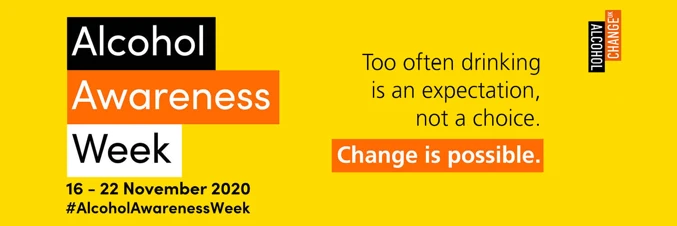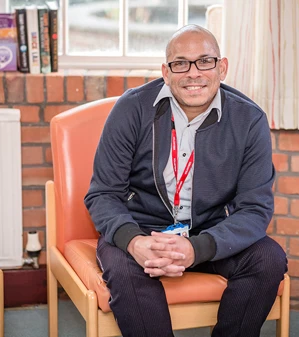Alcohol Awareness Week - Interview with Mark Holmes
Date added: 18 November 2020

Alcohol Awareness Week (16 - 22 November) is a chance for everyone in the UK to get thinking about drinking. The theme for this year is 'Alcohol and mental health’.
The COVID-19 pandemic is making everything that little bit more difficult right now and some of us may be turning to alcohol as a coping mechanism to help get through these tough times.
About 1 in 4 people in the UK will experience a mental health problem each year. Many people might be drinking to try and help manage stress, anxiety, depression and other mental health problems, but drinking too much is likely to worsen the symptoms of anxiety and depression and prevent them from being properly addressed.
This week, we will be share inspirational stories from people who have experienced alcohol and mental health problems. They want to share their stories to help challenge the shame and stigma often associated around alcohol and mental health and encourage more of us to speak openly about the difficulties we are facing as well as where to go for help and support because change is always possible.
Here we spoke to Mark Holmes, Peer support worker at Bridge House about his ongoing recovery.
Nearly five years into his recovery, some would be forgiven for thinking Mark has his battle with alcoholism under control and he can afford to relax a little; finally free of the demons that caged him for over 10 years. But Mark is not one for taking risks now, and smiling, shrugs his shoulders saying: “I take one day at a time, it’s the best way.”
Mark was an alcoholic; a label that does not define him but simply means that each day he is grateful for the life he now has and is learning to enjoy.
He owes much to Bridge House, Kent and Medway Social Care and Partnership Trust’s nine-bed detoxification unit based in Maidstone, and the experienced staff who cared and supported him at the lowest point in his life. Mark, now a clinical support worker at Bridge House, has learnt a lot over the last year and is all too painfully aware of the work he still needs to commit to doing to ensure each day is one of sobriety.
He says: “You know alcoholism is a cunning disease. It speaks to you in your own voice and the cravings don’t come to you in a conventional way - it’s far craftier than that. My inner voice creates these almost dream-like, ridiculous scenarios in my head, where I plan how I could have a drink because I have the time to, or I am in a social place where it would be possible to drink and no one would know.
“It’s so strange, but I have just come to accept these are just my cravings talking now - I recognise them. I know they will pass just as quickly as they came. I try to talk about them; dismissing them as crazy thoughts with someone I trust - it’s my way of dealing with them and it works for me.
“When I start planning how I can get a drink, that’s when I know I need to put into action all the coping strategies I have learnt during my journey. The longer I am in recovery, the more I have to be grateful for, and the more I have to lose. This is what stops me from picking up a drink again.”
Mark firmly believes the love and support of his family (his mum in particular), his life-partner and the life he has worked hard to build is what gets him through the darker days in his recovery.
He said: “One of the most common questions people ask is: ‘When do people stop being called an alcoholic or an alcoholic in recovery?’ For me, I am not sure you ever do, it is just something I accept about myself. A bit like someone who eats too much bad food and deep down knows they have to stop eating the bad food to become healthier, or someone who is a diabetic and has to take insulin to make sure they stay well. I can’t drink and if I do, it will take me to a place I don’t ever want to go again.
“Gratitude is a powerful approach which I try to practice as often as possible. I list all the things I am grateful for, including another day of sobriety. It means I stay grounded and reminds me of how different things are now, even to where I was just a year ago.”
For so many people battling alcoholism today, there is no magic cure, something which Mark is certain of.
“In the end, it was only me that could make the decision to get well, and I am grateful that eventually I did decide to get the help I so desperately needed.
“Some people are not as lucky as me and don’t make it. They never get the chance to get better; to really live again and feel the love of their family and the trust that is slowly returning with each day I choose not to drink.
“Now I get to be the son for my mum she deserves, that she can love and be proud of. That is worth everything - it’s a real gift.”
Having come so far, Mark is clear on the most important piece of advice he could give anyone who wants to start their journey to recovery…
“Believe that you can do it because at first I didn’t. Then once you take your first step, really listen to what the professionals tell you and take it all in - don’t just play lip service to it.
“I think there are two types of listening; listening with a filter, so thinking ‘this doesn’t apply to me’ and ‘that doesn’t apply to me’ and then listening with all senses open - open mind, heart, spirit and soul. You just need a willingness to live those lessons you are being taught so you can move forward – one day at a time.
“Embracing this mind set is what reminds you each and every day that you do have a choice. You can choose to live a better life just for you and one that’s completely free of alcohol, that you are in control of.”
Watch Mark’s journey to recovery with Bridge House
To find out more about how change is possible, contact www.alcoholchange.org.uk



